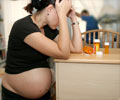Researchers studied whether acute COVID-19 symptoms are associated with subsequent depressive symptoms.

Besides information on their socio-demographics, participants were questioned on self-identified race and ethnicity, if they had been diagnosed with COVID-19 by a clinician or a positive test result, which month(s) they had been ill, the presence or absence of specific symptoms and overall perceived severity of COVID-19 illness.
Preliminary analysis revealed that out of 3904 individuals, with a mean age of 38.1, reporting prior COVID-19 illness, 1730 (44.3%) were women, 416 (10.7%) were Hispanic, 439 (11.2%) were Black, and 142 (3.6%) were Asian. The average time passed since initial COVID-19 symptoms was 4.2 months.
A total of 2046 participants (52.4%) met the criteria for symptoms of major depressive disorder. After adjusting for socio-demographics, findings showed that the presence of headache was associated with an elevated risk of moderate to greater depressive symptoms and overall severity. In addition, women were less likely to have these symptoms than men, and so were younger respondents compared to older respondents.
However, the authors state that there could be a possibility that individuals with current depression are more likely to recall or report headaches. Further, these symptoms can’t be attributed to new onset of depression as individuals with acute infection could be less likely to recover from prior depressive episodes, or those with preexisting depressive symptoms could have a greater risk of contracting COVID-19.
They add that the results add to a growing body of evidence suggesting the importance of considering potential neuropsychiatric effects of COVID-19 and suggest the importance of considering strategies that might mitigate the elevated risk of depressive symptoms following acute infection.
Advertisement
Source-Medindia















